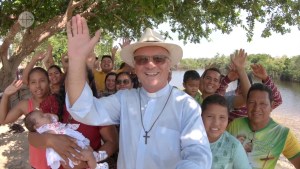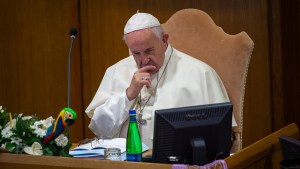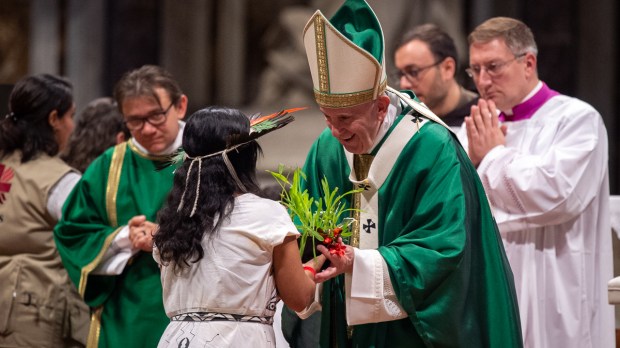Today the Holy Father has released his most recent writing: the post-synodal exhortation, Querida Amazonia. Here’s a briefing on what you should know.
What is it?
A post-synodal apostolic exhortation (or simply “apostolic exhortation”) is a letter written by the Pope reflecting on a particular theme. Apostolic exhortations typically follow Roman synods. Querida Amazonia represents Pope Francis’ response to the fall 2019 synod held in Rome.
So far, Pope Francis has written four apostolic exhortations, among them his most recent—concerning young people and the Church—Christus Vivit(2019) and the much-discussed exhortation on the subject of marriage Amoris Laetitia(2016).
The Title
“Querida Amazonia” literally means “the beloved Amazon.” Like most papal writings, the name comes from the document’s first few words. Making use of a markedly poetic form and voice, Pope Francis employs an especially lyrical style to laud the beauty of the Amazon region.
In fact, the Holy Father offers a breadth of literary knowledge, weaving excerpts of poetry throughout the text. The images and selections of verse underscore one of the exhortation’s main concerns: animating environmental and ecological stewardship.
“Dreams for the Amazon region”
Querida Amazonia is structured around four “dreams” or hopes Pope Francis has for the Amazon region. This structure calls to mind the Holy Father’s 2015 speech to the American congress which highlighted the work of four Americans. These are the four dreams, the four major sections of the exhortation:
I dream of an Amazon region that fights for the rights of the poor, the original peoples and the least of our brothers and sisters, where their voices can be heard and their dignity advanced.I dream of an Amazon region that can preserve its distinctive cultural riches, where the beauty of our humanity shines forth in so many varied ways.I dream of an Amazon region that can jealously preserve its overwhelming natural beauty and the superabundant life teeming in its rivers and forests.I dream of Christian communities capable of generous commitment, incarnate in the Amazon region, and giving the Church new faces with Amazonian features (7).
“The prophecy of contemplation”
The Holy Father, once director of a retreat center, begs the Church, “Let us awaken our God-given aesthetic and contemplative sense that so often we let languish.” (56) The invitation to allow beauty to awaken wonder calls to mind his words from Laudato Si. In that encyclical letter, Pope Francis notes that, “Saint Francis, faithful to Scripture, invites us to see nature as a magnificent book in which God speaks to us and grants us a glimpse of his infinite beauty and goodness. […] Rather than a problem to be solved, the world is a joyful mystery to be contemplated with gladness and praise.” Engendering true contemplation will unite our hearts to God and allow us to weep for our sins.
“The message that needs to be heard in the Amazon region”
For Pope Francis, love for the poor is directly, inextricably connected to love for Christ. He writes, “An authentic option for the poor and the abandoned, while motivating us to liberate them from material poverty and to defend their rights, also involves inviting them to a friendship with the Lord that can elevate and dignify them.” (63) We can never be content with a mere social message; we who have heard the Gospel love the poor because we see Christ in them. We must never be afraid to proclaim this saving reality.
“The strength and gift of women”
Recognizing the enormous contributions Amazonian women have made to their communities, Pope Francis praises women, in particular, for handing on the faith. He writes, “For centuries, women have kept the Church alive in those places through their remarkable devotion and deep faith. Some of them, speaking at the Synod, moved us profoundly by their testimony.”
Here we find Pope Francis insisting that clericalizing women would demean their accomplishments and vital contributions to the Church. The Holy Father continues, saying, “The Lord chose to reveal his power and his love through two human faces: the face of his divine Son made man and the face of a creature, a woman, Mary. Women make their contribution to the Church in a way that is properly theirs, by making present the tender strength of Mary, the Mother.”

Read more:
Father Pedro, the Polish priest who boats his way to serve the indigenous people of the Amazon

Read more:
A literature teacher pope: ‘Querida Amazonia’ a call to stop and admire something beautiful

